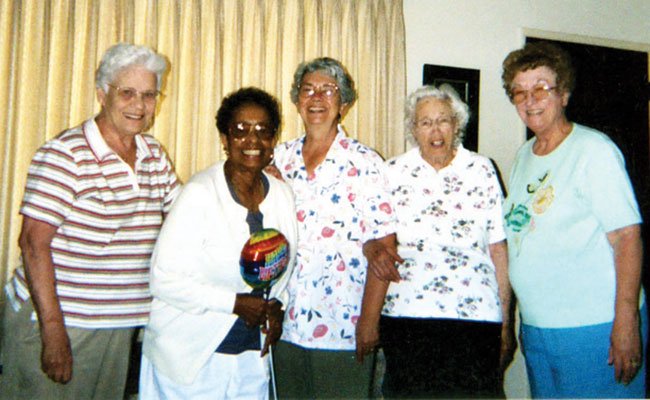When I thought about February being Black History month, an
inspiring African-American 84-year-old woman by the name of Norma
Bandy came to mind.
“Serendipity: an aptitude for making desirable discoveries by accident.”
–Dictionary.com
When I thought about February being Black History month, an inspiring African-American 84-year-old woman by the name of Norma Bandy came to mind. I first met her when she moved to Gilroy from Detroit in 2005 to be near her grandchildren. She is one of those people who draws others to herself with her positive outlook and ability to find the good in everyone around her.
The Gilroy community immediately embraced her, and she became part of a close circle of friends who treated her as if they had known her all their lives.
She began attending a Wednesday morning group made up of all Caucasian women called Serendipity. Although billed as a Bible study, the term doesn’t capture what really goes on at these meetings. Ten women or so meet in support of one another, where they talk about whatever is going on in each others’ lives. They share their heartaches and challenges, as well as a lot of wisdom, storytelling, and laughs together. They also do charitable activities.
The Serendipity ladies gradually learned Norma’s story of how she was born in St. Louis, Miss., and was orphaned by the age of four. Her maternal grandparents took her to Tennessee after her mother died from tuberculosis.
She loved going to the rural two-room school house where her grandmother taught. Her grandpa, whom she called “daddy,” was also a teacher. In the South in those days, white teachers were always paid first, while black teachers often had to wait for their pay.
“Sometimes my grandpa had to wait until summertime before he was paid,” she recalled.
The kids in her all-black neighborhood played in the streets on their “Duckies,” homemade scooters they constructed using roller skate wheels attached to boards. Norma could almost always be found racing with the boys.
“I was usually the only girl in the group. I only played dolls if there was nothing else to do,” she remembered with a chuckle. “We took men’s wool socks and made sock dolls out of them.”
“Imagination is a great thing. I never knew I was poor. Our street was adjacent to an affluent white neighborhood, and we played together,” she said. “One of my dearest friends lived there. We visited each others’ houses. We made pup tents out of gunnysacks and set them up on the vacant lot on our street. We had a grand time.”
Norma was already teaching high school during her senior year in college and earned her Master’s degree at Western Michigan University. But her real love was early elementary education, where she saw the most need.
“I saw too many adults teaching who had no patience,” she said. “I couldn’t believe how they were treating these children at such a formative time in their lives. It’s like a house – you need to lay a good foundation, or it will crumble.”
She and her husband, Riley, became very active in the National Association for the Advancement of Colored People.
“He worked for the first insurance company owned by Afro-Americans. He was a quiet and gentle man, but he had such inner strength,” Norma said of her late husband.
Her husband’s connections in the black community led to the opportunity to work with Thurgood Marshall, who would later become the first African-American appointed to the Supreme Court.
“Those were hard times,” she said. “In a time when we weren’t allowed to stay in hotels, bowl, or hold any downtown jobs – we had threats against our lives.”
Norma didn’t let restrictions and stereotypes of the time hold her back. When she wanted to take her students to the circus or camping, or when she wanted to experiment by having the same second graders return to her classroom for third grade, she got the principal to agree.
“It made such a difference to have them for two years. As second graders they were so reticent and afraid, but when they came in the second year, they knew what I expected and picked right up where they had left off and soared. Their little eyes just sparkled. I often saw them advance two to three grade levels by the end of third grade.”
Retiring after nearly 40 years of teaching, Norma enjoyed spending more time with her family. A few months ago, Norma moved to Watsonville to be closer to her great grandchildren.
But she and the Serendipity ladies are keeping their connection going. They’ve been calling and surprised her with a visit recently when they drove over the hill to take her to lunch at the Red Apple Cafe.
“Two carloads of them showed up!” Norma exclaimed. “It meant so much to me.”
In spite of struggling daily with severely crippling arthritis, Norma is always upbeat and still finds a lot of joy in life.
“I’ve enjoyed every stage of my life. You have to appreciate what you have and know when to move on, ‘when to hold ’em and when to fold ’em,’ as The Gambler said. My grandmother didn’t live to be 60, and my mother didn’t live to be 50. We’re lucky to be alive. Every Wednesday I say a little prayer for my Gilroy friends.”













